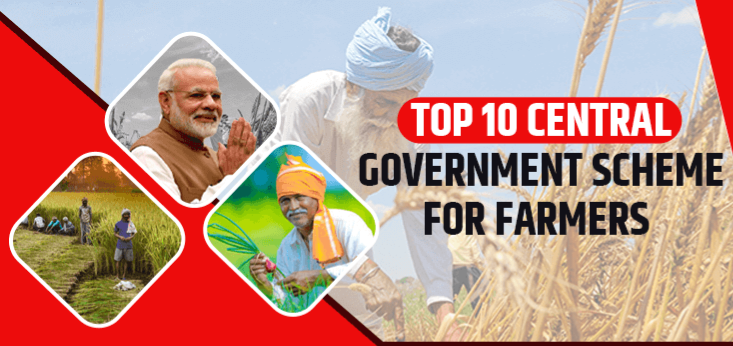
Credit image Tractor Junction
The Government of India has introduced several welfare schemes to empower farmers and promote sustainable agricultural practices. Here are some notable ones:
-
Pradhan Mantri Kisan Samman Nidhi (PM-KISAN)
PM-KISAN is a central sector scheme that provides income support to all landholding farmers’ families across the country. Under the scheme, an amount of ₹6,000 per year is transferred directly into the bank accounts of farmers in three equal installments of ₹2,000 each. The scheme aims to supplement the financial needs of farmers in procuring various inputs to ensure proper crop health and appropriate yields. It also aims to support them in meeting their household expenses. The scheme was launched to address the distress faced by the farming community due to increasing costs of inputs and low returns from agriculture.
-
Pradhan Mantri Fasal Bima Yojana (PMFBY)
PMFBY is an insurance service for farmers for their yields. It aims to reduce the premium burden on farmers and ensure early settlement of crop assurance claims for the full insured sum. Under PMFBY, farmers pay a uniform premium of 2% for all Kharif crops, 1.5% for all Rabi crops, and 5% for commercial and horticultural crops. The remaining part of the premium is borne equally by the central and respective state governments. The scheme covers risks from pre-sowing to post-harvest, including losses due to localized calamities and unseasonal rainfall.
-
Pradhan Mantri Krishi Sinchai Yojana (PMKSY)
PMKSY aims to enhance physical access to water on farms and expand cultivable areas under assured irrigation. The scheme focuses on creating sources for assured irrigation, such as farm ponds, dug wells, and check dams, and integrating water source, distribution, and application for efficient water use. It also promotes micro-irrigation technologies like drip and sprinkler systems to ensure water use efficiency. PMKSY is designed to ensure a convergence of investments in irrigation at the field level and increase the usage of irrigation in agriculture, thereby improving productivity.
-
Kisan Credit Card (KCC)
The KCC scheme provides farmers with timely access to credit to meet their short-term cultivation needs, post-harvest expenses, and other domestic requirements. The credit is extended in the form of a revolving cash credit facility, allowing for flexibility in withdrawals and repayments. The KCC also provides coverage for personal accident insurance and offers credit for allied agricultural activities such as dairy and poultry. The scheme aims to reduce farmers’ dependency on informal sources of credit, thereby reducing their debt burden and ensuring that they can meet their agricultural requirements without financial stress.
-
Soil Health Card Scheme
The Soil Health Card Scheme aims to promote soil testing and provide farmers with a soil health card, which contains nutrient status of their soil along with recommendations on appropriate dosage of nutrients to improve soil health and fertility. This helps farmers to use fertilizers and soil amendments in an efficient manner, thereby enhancing productivity and sustainability. The scheme promotes the judicious use of chemical fertilizers, minimizing their negative environmental impact, and reducing input costs for farmers. It also aims to encourage the use of organic fertilizers and bio-fertilizers for better soil health management.
-
Rashtriya Krishi Vikas Yojana (RKVY)
RKVY is a central government scheme aimed at achieving a holistic development of agriculture and allied sectors by providing states with autonomy and flexibility in planning and executing projects. It seeks to ensure farmers’ income security through increased investment in agricultural infrastructure, development of agribusinesses, and creation of additional employment opportunities. The scheme focuses on providing financial assistance for various projects, including crop development, horticulture, animal husbandry, and fisheries. RKVY emphasizes the need for integrating multiple schemes and leveraging technology to enhance agricultural productivity and profitability. -
National Agriculture Market (e-NAM)
e-NAM is a pan-India electronic trading portal that connects existing APMC mandis to create a unified national market for agricultural commodities. It aims to facilitate better price discovery for farmers through transparent auctioning processes, thereby ensuring remunerative prices for their produce. The platform allows farmers, traders, and buyers to access a nationwide market, reducing intermediaries and improving supply chain efficiencies. e-NAM promotes online trading, providing farmers with real-time information on prices, commodity arrivals, and offers, and helping them to make informed decisions. -
Paramparagat Krishi Vikas Yojana (PKVY)
PKVY is an initiative under the National Mission of Sustainable Agriculture (NMSA) that promotes organic farming among small and marginal farmers. The scheme aims to improve soil health, enhance crop yields, and reduce farmers’ dependence on chemical inputs by adopting traditional organic farming practices. Under PKVY, groups of farmers are encouraged to take up organic farming in clusters to facilitate certification and marketing of organic produce. The scheme provides financial assistance for organic inputs, certification, and training of farmers, ensuring a holistic approach to organic agriculture. -
Micro Irrigation Fund (MIF)
MIF is aimed at facilitating the adoption of micro-irrigation technologies, such as drip and sprinkler systems, which ensure efficient water use and enhance agricultural productivity. The fund provides loans to state governments to implement micro-irrigation projects, promoting water conservation and sustainable agricultural practices. MIF helps in reducing water consumption, increasing crop yields, and improving the livelihoods of farmers by enabling them to grow high-value crops with lesser water inputs. The scheme supports the government’s vision of ‘Per Drop More Crop,’ ensuring better water management in agriculture. -
National Mission for Sustainable Agriculture (NMSA)
NMSA aims to enhance agricultural productivity, particularly in rainfed areas, through sustainable practices. The mission focuses on integrated farming systems, efficient water use, soil health management, and resource conservation. It promotes climate-resilient agricultural practices and technologies to adapt to changing weather patterns. NMSA provides financial and technical support to farmers for adopting sustainable practices, such as organic farming, agroforestry, and watershed development. The mission’s goal is to ensure food security, improve livelihoods, and maintain ecological balance through sustainable agriculture.
These schemes collectively aim to improve the economic condition of farmers, ensure food security, and promote sustainable agricultural practices across India.
-
Here’s a list of Farmers Welfare Schemes by the Government of India along with their website links.
| S.No. | Scheme Name | Description | Website Link |
| 1 | Pradhan Mantri Kisan Samman Nidhi (PM-KISAN) | Provides income support to all landholding farmers’ families across the country. | PM-KISAN |
| 2 | Pradhan Mantri Fasal Bima Yojana (PMFBY) | Provides insurance coverage and financial support to farmers in the event of crop failure. | PMFBY |
| 3 | Pradhan Mantri Krishi Sinchai Yojana (PMKSY) | Enhances physical access to water on farms and expands cultivable areas under assured irrigation. | PMKSY |
| 4 | Kisan Credit Card (KCC) | Provides short-term credit to farmers to meet their agricultural needs. | KCC |
| 5 | Soil Health Card Scheme | Provides farmers with soil health cards to help them use the right fertilizers. | Soil Health Card Scheme |
| 6 | Rashtriya Krishi Vikas Yojana (RKVY) | Assists states in increasing investment in agriculture and allied sectors. | RKVY |
| 7 | National Agriculture Market (e-NAM) | A pan-India electronic trading portal which networks the existing APMC mandis to create a unified market. | e-NAM |
| 8 | Paramparagat Krishi Vikas Yojana (PKVY) | Promotes organic farming among small and marginal farmers. | PKVY |
| 9 | Micro Irrigation Fund (MIF) | Facilitates the adoption of precision-irrigation and other water-saving technologies. | NABARD MIF |
| 10 | National Mission for Sustainable Agriculture (NMSA) | Enhances agricultural productivity especially in rainfed areas focusing on integrated farming and water use efficiency. | NMSA |
Hence with context to above one can delve into more means like Organic Farming and improve the economic and global health functionalities. To know more about you may check out this link.

